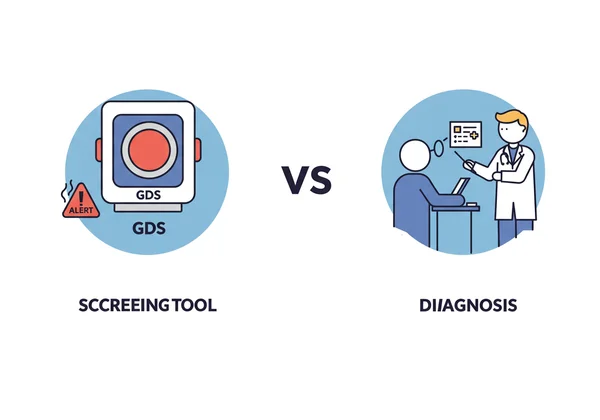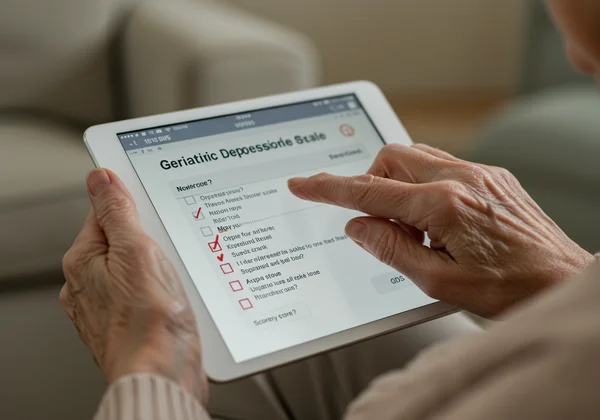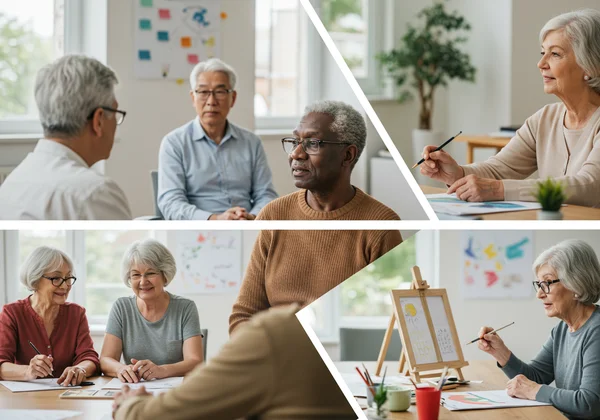High Geriatric Depression Scale Score? Your Next Steps for Senior Mental Health
August 26, 2025 | By Arthur Vance
A high score on the Geriatric Depression Scale (GDS) can certainly bring a wave of concern, but recognize it as a powerful first step—a testament to your self-awareness. So, what exactly does a high score on the Geriatric Depression Scale mean for you? This guide will provide clear, supportive, and actionable answers. View this score not as an endpoint, but as a crucial starting point—a valuable piece of information to help you or a loved one navigate the path toward better mental wellness.
The most important thing to understand is that the GDS is a highly respected screening tool, not a diagnosis. A high score simply suggests that it's a good time to have a conversation with a healthcare professional. You've already taken a positive step by seeking information; now, let's explore the next steps together. You can always revisit the GDS or learn more about the process by using a free GDS test anytime.
Understanding Your GDS Score: What It Truly Means
A number on a screen can seem stark, but it holds a story about your recent emotional experiences. The purpose of the GDS score is to translate those feelings into a format that can help guide a conversation about your mental health. It’s a tool for flagging potential concerns, allowing for early attention and support, which is crucial for maintaining a high quality of life.
Is a High GDS Score a Diagnosis of Depression?
Let's address the most critical point first: No, a high score on the Geriatric Depression Scale is not a clinical diagnosis of depression. This is a common misconception, and understanding the difference between a screening tool vs. diagnosis is essential. Think of the GDS score like a smoke detector; it alerts you to the possible presence of smoke, but it doesn't tell you if there's a fire, how big it is, or what caused it. A firefighter—or in this case, a doctor or mental health professional—is needed to assess the situation fully.
The GDS asks questions about your feelings over the past week to identify symptoms commonly associated with depression in older adults. A high score indicates that you've endorsed enough of these symptoms to warrant a more thorough evaluation by a professional. This professional evaluation is where a true diagnosis is made, considering your full health history, current life circumstances, and other potential factors.

What Do Different GDS Score Ranges Indicate?
The GDS comes in different lengths, most commonly the 30-item (long form) and 15-item (short form) versions. Each has its own scoring guide. While specific cutoffs can vary slightly, a general GDS scoring guide provides context. For the widely used 15-item GDS Short Form, scores are often interpreted as follows:
- 0-4: Generally considered within the normal range.
- 5-8: Suggests mild depression.
- 9-11: Suggests moderate depression.
- 12-15: Suggests severe depression.
These ranges are simply indicators. Our validated GDS screening tool automatically calculates and explains your score, giving you immediate feedback. However, this interpretation is just the first layer. A healthcare provider will look beyond the number to understand the nuances of your situation.

Preparing for a Doctor's Visit About Geriatric Depression
With your GDS score in hand, the next logical and most important step is talking to a doctor about depression. This conversation can be a little daunting, but preparation can make it much more productive and less stressful. Going into your appointment with organized information empowers you to be an active participant in your own healthcare.
Gathering Information Before Your Appointment
To help your doctor get a clear picture of what you've been experiencing, it’s helpful to do some symptom tracking. Before your visit, try to jot down some notes. You don’t need to write a novel; simple bullet points are perfect. Consider including:
- Your GDS Score: Bring the number and mention the test you took.
- Specific Feelings: Note the key emotions you're feeling (e.g., sadness, emptiness, irritability, loss of interest in hobbies).
- Duration and Frequency: How long have you been feeling this way? Is it constant, or does it come and go?
- Physical Changes: Mention any changes in your sleep patterns (sleeping more or less), appetite, or energy levels.
- Life Events: Have there been any recent major life changes, such as a loss, a health diagnosis, or a move?
- Medication List: Bring a complete list of all medications and supplements you are currently taking.
Tips for Communicating Effectively with Your Doctor
Effective communication is a two-way street. These tips can help you feel more confident and ensure you get the most out of your appointment. This is a form of patient advocacy—speaking up for your own needs.
- Be Open and Honest: Your doctor is there to help, not to judge. Share your feelings openly, even if it feels difficult.
- Ask Questions: Don't hesitate to ask for clarification. Good questions include: "What do you think could be causing these feelings?" or "What are the next steps you recommend?"
- Bring Someone You Trust: If you feel nervous, ask a family member or close friend to come with you for support and to help you remember the information discussed.
- Take Notes: Writing down what your doctor says can help you process the information later.
Starting this conversation is a brave step toward feeling better. An online GDS test can be a great starting point for this vital dialogue.

Exploring Geriatric Mental Health Support Options
A doctor's visit is the cornerstone of your action plan, but it's often just the beginning. There is a wide network of geriatric mental health support available to you. Building a support system that includes various resources can make a significant difference in your journey toward emotional well-being.
Beyond Medical Consultations: Other Avenues for Help
While your primary care physician is an excellent starting point, they may refer you to other specialists or recommend complementary supports. Exploring these community resources can provide additional layers of care and connection:
-
Therapy or Counseling: Speaking with a psychologist, therapist, or counselor who specializes in geriatric mental health can provide you with coping strategies and a safe space to talk.
-
Support Groups: Connecting with peers who are facing similar challenges can reduce feelings of isolation and provide a sense of community.
-
Senior Centers: These community hubs often offer social activities, wellness programs, and classes that can boost mood and engagement.
-
Helplines: Organizations like the National Alliance on Mental Illness (NAMI)or local mental health services offer free, confidential support.

The Role of Caregivers and Family in Support
For family members and caregivers, seeing a loved one struggle is difficult. Your support is invaluable, but it's important to approach the situation with empathy and patience. Providing family caregiver support means being a partner in their health journey.
- Listen Without Judgment: Offer a compassionate ear. Let them share their feelings at their own pace.
- Offer Practical Help: Assist with scheduling appointments, providing transportation, or helping them remember to take medications.
- Encourage, Don't Push: Gently encourage them to follow their doctor’s advice and engage in activities they once enjoyed, but respect their boundaries if they aren't ready.
- Take Care of Yourself: Caregiver burnout is real. Ensure you have your own support system and take time for yourself.
Your Next Steps to Positive Senior Mental Health
Receiving a high GDS score is not a final word on your well-being. Instead, view it as an important signal—a catalyst for taking proactive steps to care for your emotional health. You have already demonstrated courage by seeking answers. The key is to keep moving forward, one manageable step at a time.
your GDS score serves as a vital signal for initiating a crucial conversation with your doctor, rather than a definitive diagnosis. Proactive preparation for this visit will empower you in your healthcare journey. Remember, a robust network of support is readily available for both you and your loved ones. Embrace this path to rediscover joy, engagement, and a truly fulfilling life. If you're ready to learn more or retake the assessment, you can Start your assessment today.
Frequently Asked Questions About High GDS Scores
What does a high score on the Geriatric Depression Scale mean?
A high score on the Geriatric Depression Scale (GDS) means that you have reported experiencing several symptoms commonly associated with depression in older adults over the past week. It serves as an indicator that a follow-up conversation with a healthcare professional is strongly recommended to explore these feelings further.
Is the Geriatric Depression Scale a diagnostic tool?
No, it is not a diagnostic tool. The GDS is a screening instrument designed to detect potential signs of depression. A formal diagnosis can only be made by a qualified healthcare professional, such as a doctor or psychiatrist, after a comprehensive clinical evaluation.
What is a normal score on the Geriatric Depression Scale?
On the 15-item GDS short form, a score between 0 and 4 is typically considered within the normal range and suggests depression is unlikely. However, any concerns about your emotional health should always be discussed with a doctor, regardless of your score on a free geriatric depression scale.
Who can use the Geriatric Depression Scale?
The GDS was specifically designed for older adults, typically those aged 55 and over. It is used by seniors for self-assessment, by family members and caregivers to monitor a loved one's well-being, and by healthcare professionals in clinical settings for quick and effective screening.